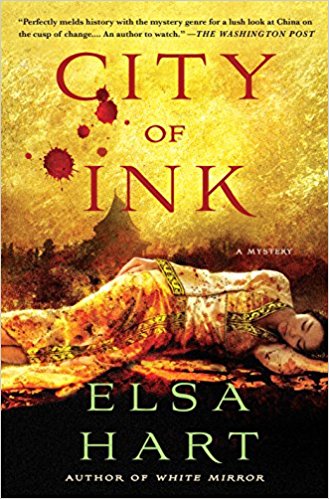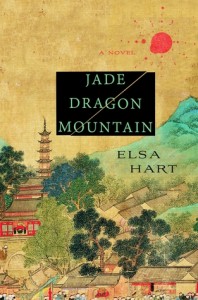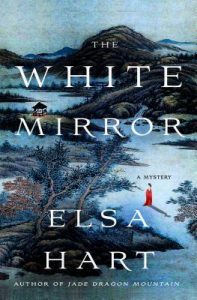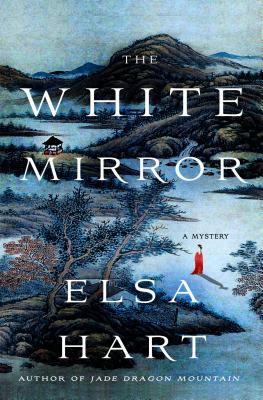 City of Ink (Li Du Novels #3) by Elsa Hart
City of Ink (Li Du Novels #3) by Elsa Hart Format: eARC
Source: supplied by publisher via Edelweiss
Formats available: hardcover, ebook, audiobook
Genres: historical mystery
Series: Li Du #3
Pages: 352
Published by Minotaur Books on August 21, 2018
Purchasing Info: Author's Website, Publisher's Website, Amazon, Barnes & Noble, Kobo, Bookshop.org
Goodreads
Following the enthralling 18th century Chinese mysteries Jade Dragon Mountain and White Mirror, comes the next Li Du adventure in Whisper of Ink.
Li Du was prepared to travel anywhere in the world except for one place: home. But to unravel the mystery that surrounds his mentor’s execution, that’s exactly where he must go.
Plunged into the painful memories and teeming streets of Beijing, Li Du obtains a humble clerkship that offers anonymity and access to the records he needs. He is beginning to make progress when his search for answers buried in the past is interrupted by murder in the present.
The wife of a local factory owner is found dead, along with a man who appears to have been her lover, and the most likely suspect is the husband. But what Li Du’s superiors at the North Borough Office are willing to accept as a crime of passion strikes Li Du as something more calculated. As past and present intertwine, Li Du’s investigations reveal that many of Beijing’s residents ― foreign and Chinese, artisan and official, scholar and soldier ― have secrets they would kill to protect.
When the threats begin, Li Du must decide how much he is willing to sacrifice to discover the truth in a city bent on concealing it, a city where the stroke of a brush on paper can alter the past, change the future, prolong a life, or end one.
My Review:
 Like its absolutely marvelous predecessors, Jade Dragon Mountain and The White Mirror, City of Ink is an immersive journey into 18th century China that pulls the reader all the way in and doesn’t let go even after the end.
Like its absolutely marvelous predecessors, Jade Dragon Mountain and The White Mirror, City of Ink is an immersive journey into 18th century China that pulls the reader all the way in and doesn’t let go even after the end.
In other words, I finished this last night and I still have a terrible book hangover. A part of me is with the storyteller Hamza, still following Li Du around Beijing in search of solutions, both to the seemingly sordid murder that has his current attention and his quest to find justice for his friend and mentor, whose earlier crimes sent Li Du into exile before the beginning of his story (at least to us) in Jade Dragon Mountain.
As City of Ink begins, Li Du has been back in Beijing for two years. At the end of The White Mirror it was obvious that he was planning to turn back towards home, and he has done so But his exile is now 9 years in the past, and events in the capital have moved on from where they were when he left.
His beloved library is no more – or at least it is no longer staffed by librarians like Li Du. His wife divorced him in the wake of his exile, and even though that exile was rescinded by a grateful emperor at the end of Jade Dragon Mountain, his marriage is over, as is his career.
We return to this world to find Li Du as an overqualified clerk in a lowly office, assisting his supervisor (and cousin) by performing all of the clerical work that the other man has no desire to do. As overqualified as Li Du is for the job, it leaves him plenty of time to surreptitiously search other offices for documents relating to the crime his mentor was accused of. Li Du has discovered that the man was innocent – and needs to prove it – if only to his own satisfaction.
After two years he believes he has reached the end of the trail. He has found the man who links all of the other conspirators in that long-ago treason. Or at least links all of the others except his old friend. But his confrontation with the man proves unsatisfactory, leaving Li Du at loose ends.
His interest is taken up by what at first seems like a simple murder case. It is the job of his office to investigate crimes before turning the evidence over to the magistrates, and this crime seems simple enough. A man and a woman are found dead in a locked room at the site of her husband’s business. It looks like the husband found them in flagrante delicto and killed them both in a drunken rage. Under these particular circumstances, the crime will be forgiven.
But Li Du, as usual, finds that all is not as it initially seems. The husband, after all, believes that he would at least remember murdering his wife and her lover, no matter how drunk he was. And he was very, very drunk, but he does not remember committing murder.
Li Du, frustrated in his inability to find justice for his old friend, becomes determined to seek out justice in this case. And refuses to let go no matter how often he is first requested and then ordered to turn it over to the magistrate. Where the magistrate sees the later suicide of the husband as proof of his guilt, Li Du merely sees it as proof that the prison guards can be bribed – only because they can be.
 Just as with the cases in both Jade Dragon Mountain and The White Mirror, Li Du is left to navigate the conflicting possibilities of not just who benefits from these particular murders, but also who benefits from covering them up.
Just as with the cases in both Jade Dragon Mountain and The White Mirror, Li Du is left to navigate the conflicting possibilities of not just who benefits from these particular murders, but also who benefits from covering them up.
And finds himself led right back to the place where he began, unravelling the mystery that left his old friend convicted of a treason that he certainly did not commit.
Escape Rating A: I started this on the plane from California, and wasn’t ready to let it go when I landed. And I’m still not.
Usually when I get really invested in a mystery series, it’s because of the characters. But when I get this invested in a fantasy or science fiction series, it is often all about the worldbuilding. The Li Du series are unusual for me in that it isn’t about the characters, it’s about the immersiveness of the world.
This is not to say that I don’t like Li Du, because I do. But he is also a bit of a cypher – or perhaps an onion whose outer skin has just begun to peel back. In his exile, he became extremely wary of revealing much of himself to much of anyone – and that is even more true in his return to Beijing. He is currently hiding much of his light under his bushel basket, and as a consequence the reader only sees bits of his true self peek out.
But the world, the recreation of early-18th century China, sucks the reader right in and doesn’t let go. This is one of those books where you see the sights, smell the smells, and feel the cobbles under your feet just as Li Du does.
City of Ink, as well as the first book, Jade Dragon Mountain, are very much political mysteries. While Li Du is always following the investigator’s first premise, “Who benefits?”, he is best when he does so in an urban environment redolent with politics and the stink of political corruption. His ability to solve the crime relies on not just his intelligence but also his knowledge of the way that things work in the world that he used to inhabit – that of the Imperial court.
That the catchphrase “power corrupts; absolute power corrupts absolutely” was not said until more than a century after this series takes place, and half a world away at that, does not change the applicability of the axiom. In City of Ink, it is up to Li Du’s dogged persistence to figure out whose corruption lies at the heart of this case, and whose power is determined to cover it up.
This is a world that I can’t wait to step back into. May Li Du’s journeys long continue!

 The White Mirror (Li Du Novels #2) by
The White Mirror (Li Du Novels #2) by